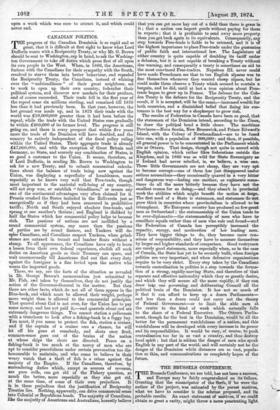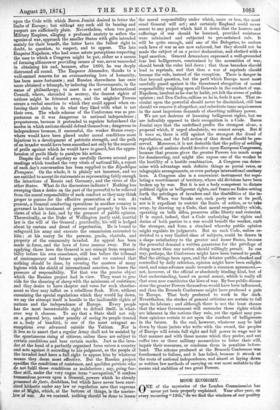THE BRUSSELS CONFERENCE.
THE Brussels Conference, we are told, has not been a success, and Europe may be fairly congratulated on its failure. Granting that the emancipator of the Serfs, if he were the author of the project, was animated by the purest motives, what we have to consider is the scheme proposed, and its- probable results. An exact statement of motives, if we could. obtain so great a rarity, might throw a more penetrating light. upon the Code with which Baron Jomini desired to fetter the limbs of Europe ; but without any such aid its bearing and purport are sufficiently plain. Nevertheless, when two great Military Empires, alleging a profound anxiety to, soften the agonies of war, approach the smaller States with gifts intended mainly for their benefit, the latter have the fullest right to doubt, to question, to suspect, and to oppose. The late Emperor Napoleon, who had some astute perceptions respecting the uses to which a Congress might be put, either as a means of forming alliances or providing causes of war, never succeeded in obtaining his end, because, after 1860, he was deeply distrusted all round. The Emperor Alexander, thanks to a well-earned renown for an overmastering love of humanity, has been more fortunate ; and Russian sluvwdness has once more obtained a triumph, by inducing the Governments, in the name of philanthropy, to meet in a sort of International Council, where, shrouded in secrecy, the dearest rights of nations might be frittered away, and the mightier Powers secure a verbal sanction to which they could appeal when en- forcing their claim to do what they liked with what is not their own. The whole scheme of the Conference was as pre- posterous as it was dangerous to national independence ; preposterous, because it pretended to regulate beforehand the modes in which nations should defend themselves ; dangerous to independence because, if successful, the weaker States every- where would have been placed under moral conditions most injurious to a development of patriotic strength, and the path of an invader would have been smoothed not only by the removal of perils against which he would have to guard, but the appre- hension of perils likely to paralyse his action. Despite the veil of mystery so carefully thrown around pro- ceedings which touched the very vitals of national life, a report of each day's conversation has been supplied to the .Ripublique Frangaise. On the whole, it is plainly not incorrect, and we are entitled to accept its statements as representing fairly enough the intentions of Russia and Germany, and the views of the other States. What do the discussions indicate ? Nothing less sweeping than a desire on the part of the powerful to be relieved from the moral responsibility of such conduct as they may think proper to pursue for the effective prosecution of a war. At present, a General conducting operations in another country is governed in his treatment of persons and property by his own views of what is fair, and by the pregsure of public opinion. Theoretically, as the Duke of Wellington justly said, martial law is the will of the• General ; practically, his will is hedged about by custom and dread of reprobation. He is bound to safeguard his army and execute the commission entrusted to bins; at his mercy lie the persons; goods, chattels, and property of the community invaded. An appeal has been made to force, and the laws of force assume sway. But in applying those laws the General is not exempt from responsi- bility before his own conscience, still leas before the tribunal of contemporary and future opinion ; and we contend that nothing should be done, by covering the masters of many legions with the shield of international sanction, to lessen the pressure of responsibility. Yet that was the precise object which the Russian project had in view. They want to pro- vide for the shearing of sheep with the minimum of resistince; and they desire to have chapter and verse for such chastise- ment as they may inflict on a rebellious flock. Now, without examining the special regulations which they would lay down, we say the attempt itself is hostile to the inalienable rights of nations and the independence of Europe. Every people has the most incontestable right to defend itself, in what- ever way it chooses. To say that a State shall not rely on a general levy, under penalty of seeing its people treated as a. body of banditti, is one of the most arrogant as- sumptions ever advanced outside the Vatican. or is it less so to assert that a regular Army shall not be assisted by the spontaneous rising of citizens, unless these are subject to certain conditions and bear certain marks. Just as the inva- der at the head of a perfectly organised force enters a country and acts against it according to his judgment, so the people of the invaded land have a full right to oppose him by whatever means they deem most effective. But the Russian project specifies the conditions of resistance, and qualifies patriots who do not .fulfil those conditions as malefactors ; nay, going fur- ther still, under the very vague term "occupation," it confers tremendous powers upon a General, powers which he already possessed de facto, doubtless, but which have never been exer- cised hitherto under any law or regulation save that supreme one of Might, which, at the bottom of things, is the master- law a war. As we contend, nothing should be done to lessen'
the moral responsibility under which, more or less, the most cruel General will act; and certainly England could never assent to any project which laid it down that the horrors and sufferings of war should be lessened, provided resistance were minimised and subjected to pre-erdained rule. It will be quite enough, said one of the Delegates, to endure such laws of war as are now enforced, but they should not be made the subject of an a priori declaration, and clothed with-a legal sanction. General Arnaudeau expressed a well-grounded fear lest belligerents, constrained by the necessities of war, should break the rules laid down ; that these breaches should lead to reprisals, and that thus a war of reprisals should become the rule, instead of the exception. There is danger in that beyond question, but the peril which Europe must most carefully guard against is the threatened abrogation of moral responsibility weighing upon all Generals in the conduct of war. Napoleon, insolent as he was by habit, yet felt the stress of public opinion ; and Don Carlos, callous as he is, feels it now. That re- straint upon the powerful should never be diminished, still less should we remove it altogether, and substitute tame acquiescence in the most imperious demands of absorbing military power.
We are not desirous of lessening belligerent rights, but we are inflexibly opposed to their recognition in a Code. Baron Jomini says that the undefined profits the strongest alone, a proposal which, if urged absolutely, we cannot accept. But if it were so, there is still against the strongest the dread of reprobation, and the full action of that dread should be pre- served. Moreover, it is not desirable that the policy of settling the rights of nations should devolve upon European Congresses, because that process gives the greater Powers too much scope for domineering, and might also expose one of the weaker to the hostility of a hostile combination. A Congress can deter- mine with advantage such definite things as postal rates, or telegraphic arrangements, or even perhaps international sanitary laws. A Congress also is a convenient instrument for regu- lating a resettlement of territory, where old divisions have been broken up by war. But it is not a body competent to dictate political rights or belligerent rights, and frame an Index setting forth the privileges of invaders and the disabilities of the in- vaded. When war breaks out, each party Acts at its peril, nor is it expedient to restrict the limits of action, or to take away, by drawing up a Code, that moral responsibility which, operating on both sides, preserves alike liberty and restraint. It is urged, indeed, that a Code embodying the rights and duties of both parties to a war would benefit the weaker, curb the stronger, and form a standard whereby public opinion might regulate its judgments. But no such Code, unless re- stricted to a very limited class of subjects, eould be drawn in a shape satisfactory to the greater and lesser States, because the powerful demand a written guarantee for the privilege of doing more than any nation should willingly permit. In one way, perhaps, the Conference might have been turned to profit. Had the sittings been open, and the debates public, checked and controlled by daily criticism, opinion might have been enlight- ened, and some advance made towards a common agreement,— not, however, of the official or absolutely binding kind, but of that understanding, based on moral assent, which is really all that even now constitutes the gws of war. By free public-discus- sions the greater Powers themselves would have been influenced, and thus the Brussels Conference might have produced a gain to Europe. That body preferred to work in the dark Nevertheless, the strokes of general criticism are certain to fall upon its labours ; and although there is not the least chance that the wiser Government will surrender those rights which are inherent in the nations they rule, yet the upshot may pro- duce opinions certain to act upon the conduct of belligerents in the future. In the end, however, whatever may be laid down by those jurists who write with the sword, the peoples of Europe will retain full right and full power to wage war in that manner and with those means which they prefer, and not suffer two or three military monarchies to fetter their will, impair their resources, or condemn them in penalties before- hand. The scheme produced at the Brussels Conference was foredoomed to failure, and it has failed, because it struck at the roots of national independence, and aimed at laying down as written law methods of carrying on war most suitable to the means and ambition of two great Powers.































 Previous page
Previous page